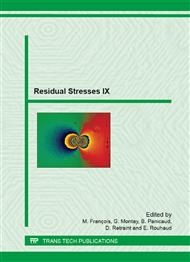p.628
p.634
p.640
p.646
p.652
p.658
p.664
p.670
p.676
Residual Stresses in Different Heat Treated Workpieces after Turning
Abstract:
The use of short process chains for the realization of complex and high performance components is a reasonable approach to achieve sustainable products and to reduce energy consumption. In the Collaborative Research Center SFB/TR TRR30 which is supported by the German Research Foundation DFG this approach is investigated applying thermo-mechanically forming processes. In this way, combining hot metal forming and heat treatment steps in a single process, tailored materials properties together with appropriate geometries are achieved [1, 2] . However, still additional machining operations, e. g. turning operations in case of shafts, are needed to achieve proper workpiece finish. Due to locally varying mechanical properties, undesired changings of the process conditions occur, leading to varying surface and subsurface properties, e.g. the residual stress state. It is well known that residual stresses have a major impact on the components properties during service [3]. In this paper, a survey is given about near surface residual stress states after exterior dry turning of differently heat treated cylindrical workpieces made of steel AISI 6150.
Info:
Periodical:
Pages:
652-657
DOI:
Citation:
Online since:
August 2014
Keywords:
Permissions:
Share:
Citation:


